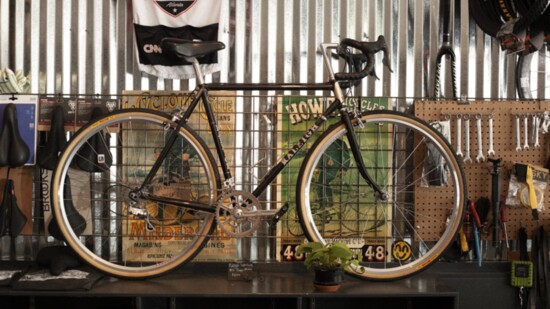If you ask local business owners David and Lisa Morris to explain it in the simplest terms, they are happy to tell you their space at 115 Clairemont is one part bike shop and another part coffeeshop. With a sprinkling of entrepreneurial spirit, too.
The straightforward description is literal but effective if you want a new tire for your road bike or a cortado for a walk around Downtown Decatur. But spend a little time there, and you will realize there is much more to it.
Somewhere between the walls adorned to the ceiling with every bike part imaginable and a re-creation of a comfy living room atmosphere is the real heart of the place: community.
The Morrises have lived in Decatur for 17 years and have seen the city change aplenty over that time, both in business and infrastructure. While the city skyline has undoubtedly changed, David believes the basic need for building community has remained constant and admittedly a little underfed.
After a long career in the healthcare industry, David found himself questioning his next steps during the global pandemic in 2020. He and his wife had a lifetime goal of owning a business centered around community building. Originally hailing from small towns, Lisa recounts her observations from growing up near a hardware store where the men would gather daily to fellowship with each other regardless of whether they needed to buy something—a palpable anecdote of community.
The pandemic triggered their dreams of creating a space that would make people feel the same way: a third place. The family, including their two daughters, felt the impact of the loss of third places–defined as places for social engagement behind the home and the workplace–in 2020 and have observed some of the troubling social trends within their own community in the years following.
“How are communities going to stay alive if they don’t have lots of third places?” asked David, pausing and looking around the group for an answer before continuing.
“While we were motivated to start a family business, to start something we could build collaboratively,” said David, “we also wanted a business addressing what we saw as holes in the layers of community.
“We have no idea how it will work, but we felt like we needed to be part of the solution.”
David notes that the primary concern has been observing people emerge from their homes post-pandemic only to retreat back quickly.
“The trajectory I see is that our families will be so centered around our homes instead of our communities,” urged David. “It’s going to be a strange place—very isolating, very alienating.”
Enter Guild + Journeyman.
Over the last 18 months, the Morrises' experimental approach to their business has become a vital space for learning and conversation. There is always something new to see, and you never quite know who you will bump into while waiting in line for a coffee. That has been the favorite part of the shop for the Morris family, which extends to their bike-fixing extraordinaire, Tom. Guild + Journey has indeed become a place to be, to experience.
While David was unsure how community building would manifest within his space, he knew it had to include craftsmanship as a central component of its business model. So much of the conversation and connections cultivated between strangers have stemmed from observing someone tackling a task.
Where else, David asks, can you be in the space of a craftsperson and watch them hone their craft? Families bring in their bikes to get a new chain but come away entranced by Tom's handiwork, or a community member looking for a new outlet observes another doing crochet on a couch out of the corner of their eye. Soon, a blossoming group begins to meet together.
That is the beauty of Guild + Journeyman and, ultimately, the purpose behind its existence: to bring people together.
They hope you will pop in soon for a coffee and stay for a while. You could learn something new.
